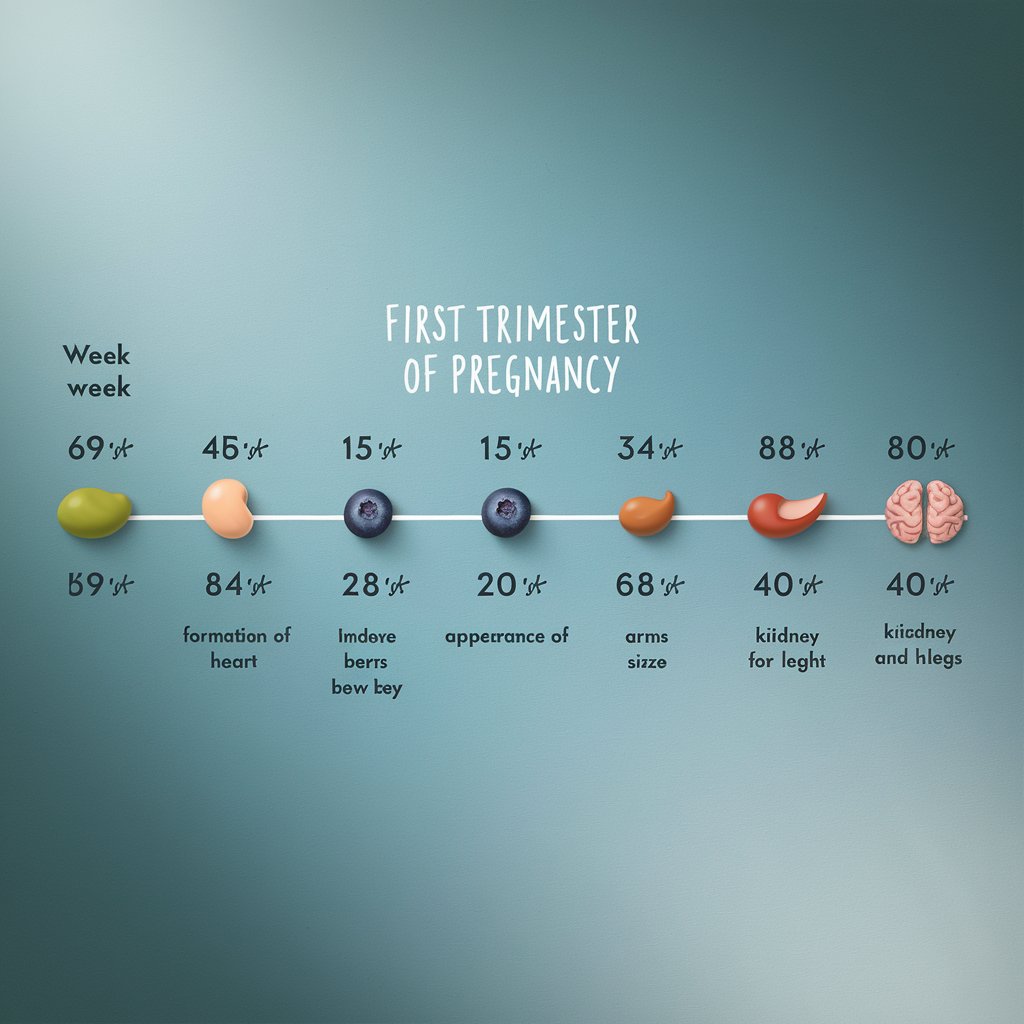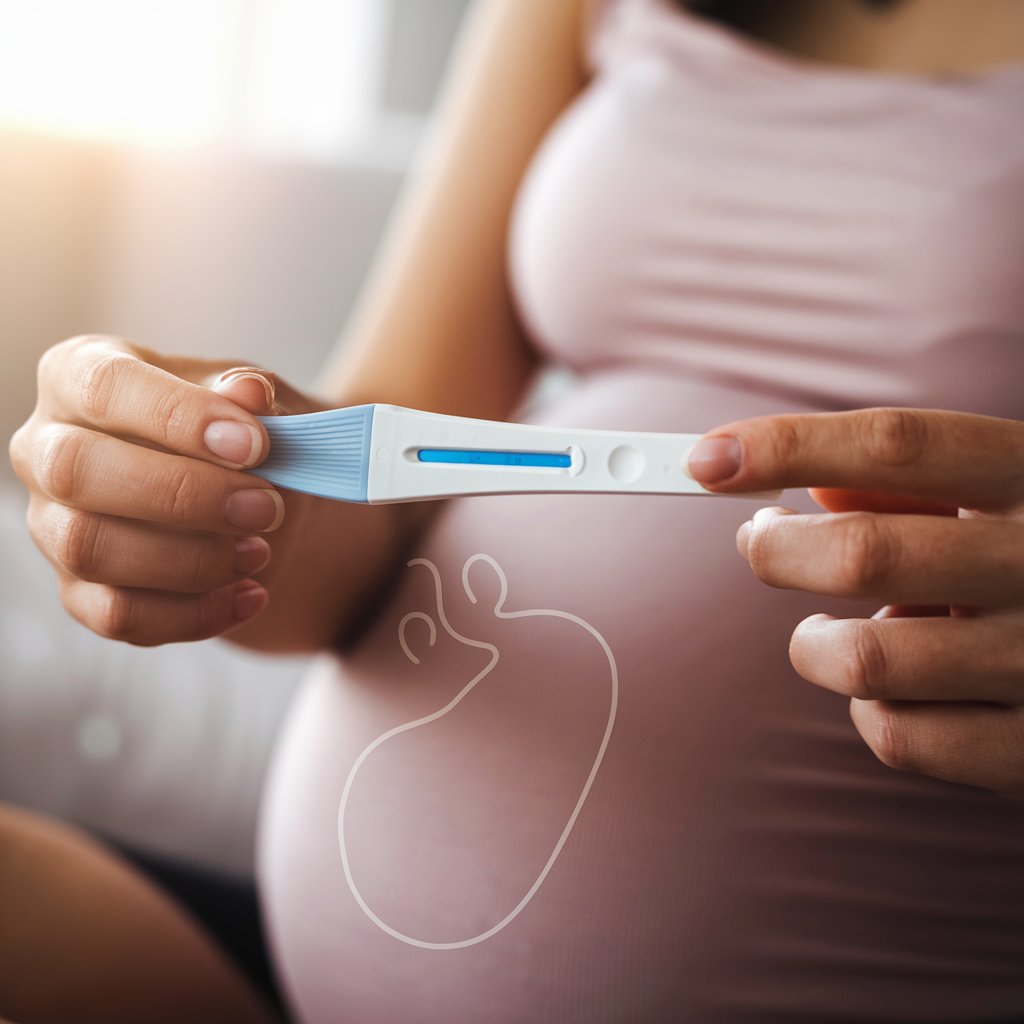Week by Week First Trimester
Introduction
The first trimester of pregnancy, spanning from weeks 1 to 12, is a critical time filled with profound changes for both the mother and the developing baby. Understanding this transformative period week by week can help expectant parents feel more prepared and empowered to navigate the journey ahead. From the earliest signs of pregnancy to crucial prenatal care, this guide will cover every aspect of the first trimester. We’ll break down each week, highlight common symptoms, and offer practical tips to help you make the most of these exciting and sometimes challenging early months.
What is the First Trimester? A Quick Overview
The first trimester begins on the first day of your last menstrual period and ends at the close of week 12. During this time, the baby undergoes rapid development, transforming from a single fertilized cell into a fully formed fetus with a heartbeat, tiny limbs, and the beginnings of all major organs. Physically, emotionally, and hormonally, expectant mothers also experience dramatic changes.
First Trimester Overview:
| Weeks | Developmental Milestone |
|---|---|
| Weeks 1-4 | Fertilization, cell division, and implantation |
| Weeks 5-8 | Organ development, heartbeat detection |
| Weeks 9-12 | Fetal period begins, organs and muscles continue growing |
By understanding what happens week by week, parents can better anticipate each stage and feel equipped to take on the first trimester.
Week-by-Week Guide to the First Trimester
Week 1 and 2: Preparing for Pregnancy
Weeks 1 and 2 are often considered the pre-conception period, during which your body prepares for pregnancy. Here’s what happens:
Conception and Early Changes in the Body
- How Conception Works: Conception typically occurs when a sperm fertilizes an egg, leading to the formation of a zygote. This zygote will eventually develop into an embryo.
- Early Body Changes: During these weeks, your body may begin to undergo subtle changes, including hormonal fluctuations that prepare the uterus for a potential pregnancy.
Understanding the “Two-Week Wait”
- What is the Two-Week Wait?: This is the time frame between ovulation and your expected period when you may be wondering if you’re pregnant. During this period, it’s common to experience a mix of hope and anxiety.
Tips for Improving Conception Chances
To enhance your chances of conception, consider the following tips:
- Track Ovulation: Use ovulation kits or apps to predict your most fertile days.
- Healthy Lifestyle: Maintain a balanced diet, exercise regularly, and reduce stress to promote reproductive health.
- Avoid Alcohol and Smoking: These substances can negatively impact fertility.
Week 3: Fertilization and Early Development
In Week 3, after fertilization, the early stages of development begin:
Explanation of Fertilization and Initial Cell Development
- Fertilization: The sperm and egg unite, forming a zygote that begins to divide and grow. This process continues as the zygote travels down the fallopian tube toward the uterus.
- Blastocyst Stage: By the end of this week, the developing cells form a blastocyst, which will eventually implant into the uterine lining.
Early Pregnancy Symptoms
Some women may notice early pregnancy symptoms, including:
- Light Cramping: Mild cramping can occur as the blastocyst prepares for implantation.
- Spotting: Light spotting, often called implantation bleeding, may happen as the embryo attaches to the uterine wall.
Tracking Basal Body Temperature
- Tip: Tracking your basal body temperature (BBT) can be an effective early indicator of pregnancy. A sustained increase in BBT after ovulation may suggest conception.

Week 4: Implantation and Pregnancy Detection
As you enter Week 4, significant developments occur as implantation takes place:
Blastocyst Implantation and hCG Hormone Production
- Implantation: The blastocyst implants itself into the uterine lining, which triggers the production of the human chorionic gonadotropin (hCG) hormone.
- hCG Role: This hormone is essential for maintaining the pregnancy and is the basis for most pregnancy tests.
Symptoms at This Stage
Women may start experiencing early symptoms, such as:
- Mild Cramping: A sign of implantation as the uterus adapts to the new growth.
- Light Spotting: This is normal and should be minimal.
When to Take a Home Pregnancy Test
- Testing for Pregnancy: Most home pregnancy tests can be taken around the time of your expected period (about a week after your missed period) for the most accurate results. Testing too early may lead to a false negative due to low hCG levels.
Week 5: Early Pregnancy Hormones Begin Rising
Entering Week 5, your body undergoes significant hormonal changes:
Development of the Embryo and Formation of the Placenta
- Embryo Development: The embryo starts to develop its basic structures, including the beginnings of the heart and neural system.
- Placenta Formation: The placenta begins to form, which will provide nutrients and oxygen to your baby.
Symptoms Increase
Common symptoms during this week include:
- Fatigue: Increased tiredness is common due to hormonal changes.
- Nausea: Morning sickness may begin to surface, affecting many women.
- Heightened Sense of Smell: Many women report an increased sensitivity to smells, which can contribute to nausea.
Importance of Prenatal Vitamins
- Folic Acid: It’s crucial to take prenatal vitamins, especially those containing folic acid, which supports the early development of the neural tube and helps prevent neural tube defects.
Week 6: Significant Developmental Changes
In Week 6, your baby undergoes remarkable changes:
Heartbeat Begins; Neural Tube Development
- Heartbeat: A detectable heartbeat often begins this week, marking a significant milestone in pregnancy.
- Neural Tube Development: The neural tube, which will develop into the brain and spinal cord, continues to form.
Symptoms Intensify
As pregnancy progresses, you may experience intensified symptoms:
- Morning Sickness: Many women experience heightened nausea during this period.
- Mood Swings: Hormonal fluctuations can lead to emotional ups and downs.
Tips for Managing Nausea and Morning Sickness
To cope with morning sickness:
- Stay Hydrated: Sip water or herbal teas throughout the day.
- Eat Small Meals: Consuming small, frequent meals can help maintain stable blood sugar levels and reduce nausea.
- Ginger or Peppermint: Consider natural remedies such as ginger tea or peppermint candies to alleviate nausea.
Week 7: Rapid Growth and Hormonal Changes
At Week 7 of the first trimester, significant growth occurs as your baby continues to develop rapidly. During this week:
- Limb and Organ Formation Begins: The early formation of arms and legs begins, and basic structures of organs start taking shape. This is a crucial period where every system starts to form, from the heart to tiny kidneys and lungs.
- Amniotic Fluid Increases: As the baby grows, the amount of amniotic fluid around them increases to provide cushioning and protection.
Common Symptoms
By now, you may experience:
- Food Aversions: Certain foods or smells may suddenly become unbearable.
- Sensitive Breasts: Due to hormonal surges, breast tenderness often intensifies.
Nutrition Tip
To manage these discomforts, try eating smaller, nutrient-dense meals throughout the day. Choosing bland, light snacks can also help reduce nausea and food aversions.
Week 8: Important Growth Milestones
As you reach Week 8, your baby is growing quickly and hitting key developmental stages. During this week:
- Face Formation Begins: Features like the eyelids, nose, and upper lip begin to form. Your baby’s head appears larger than the body, but this will balance out in later weeks.
Coping with Symptoms
With increased hormone levels, fatigue and emotional shifts are common. Here are a few strategies:
- Prioritize Rest: Take naps or rest whenever possible, even short breaks help.
- Hydrate Regularly: Staying hydrated can help reduce fatigue and improve energy levels.
Week 9: Fetal Movement Begins (Though Not Felt)
In Week 9, your baby can now make tiny movements, even though you won’t feel them yet. Here’s what’s happening:
- Development of Fingers and Toes: Tiny muscles start to form in your baby’s fingers and toes, allowing for initial movements.
Emotional Wellness Tips
This stage can bring heightened emotions, from excitement to worry. To maintain balance:
- Practice Deep Breathing or Meditation: These techniques can help you manage stress and stay calm.
- Maintain a Balanced Lifestyle: Get gentle exercise and enjoy time with loved ones to boost your mood.

Week 10: Almost Fully Formed (End of Embryonic Phase)
At Week 10, the embryonic phase concludes, and your baby’s organs are almost entirely formed. During this time:
- Bone Hardening: Bone tissue begins to harden, making the skeletal structure more robust.
- Organ Development: Most of the primary organs are in place, with continued development ahead.
Common Symptoms
You might experience:
- Round Ligament Pain: Stretching in the abdomen as your uterus expands.
- Increased Urination: As the uterus grows, it places pressure on the bladder.
Health Tips
- Balanced Diet: Continue to eat a diet rich in proteins, vegetables, and whole grains.
- Hydration: Stay well-hydrated to support your body as it works overtime.
Week 11: Baby Growth Continues
Week 11 marks the beginning of the fetal period, with significant growth in your baby’s size and development.
- Rapid Growth: Your baby is quickly gaining size and weight. During this period, your baby’s body starts to straighten, resembling a tiny newborn.
Symptom Updates
Some women report a reduction in nausea around this time, though fatigue may still be present. However, everyone’s experience varies.
Healthy Snacks for Nutritional Support
Opt for nutrient-dense snacks, such as:
- Greek yogurt with fruit
- Nuts and seeds
- Sliced veggies with hummus
Week 12: Approaching the End of the First Trimester
By Week 12, your first trimester is nearly complete, and your baby is preparing for more growth in the second trimester. Here’s what’s happening:
- Sucking Movements: Your baby is now able to make sucking movements, which is a developmental milestone in preparing for feeding after birth.
- Organ Complexity: Major organs are now becoming more complex and fine-tuned, preparing for the critical roles they’ll play.
Preparing for the Second Trimester
As you transition, consider:
- Upcoming Tests and Appointments: Schedule appointments for genetic screenings and NT (nuchal translucency) scans if recommended by your healthcare provider.
- Addressing Concerns: This is a great time to ask questions about future screenings or discuss any lingering symptoms with your doctor.
Common Symptoms During the First Trimester (And How to Cope)
Each week brings new changes, often accompanied by a mix of excitement and discomfort. Here’s a look at some common symptoms and how to manage them.
Fatigue and How to Manage It
Fatigue is almost universal in the first trimester. It’s partly due to hormonal changes and partly due to the intense work of early fetal development.
Tips for Managing Fatigue:
- Prioritize sleep, aiming for at least 7-8 hours each night.
- Eat Energy-Boosting Foods: Foods rich in protein and complex carbohydrates can help.
- Stay hydrated, as dehydration can worsen tiredness.
Nausea and Morning Sickness
Morning sickness affects about 70-80% of women in the first trimester. Though most common in the morning, it can occur at any time of day.
Remedies for Morning Sickness:
- Ginger tea or ginger candies can soothe the stomach.
- Eating small meals throughout the day may prevent queasiness.
- Avoiding spicy, greasy, or strong-smelling foods can also help.
Mood Swings and Emotional Changes
Hormonal fluctuations often lead to mood changes in the first trimester.
Tips for Managing Mood Swings:
- Practice mindfulness or yoga, which can stabilize emotions.
- Stay connected with loved ones for support.
- Take regular breaks for rest and relaxation.
Spotting and Light Bleeding: What’s Normal?
Light bleeding, or spotting, can be expected as the embryo implants. However, consult your healthcare provider if spotting becomes heavy or painful.
Essential Tips for Each Stage of the First Trimester
Each stage of the first trimester comes with unique challenges and requirements. Here’s what to keep in mind as you progress:
Weeks 1-4 Tips
- Begin taking prenatal vitamins daily (especially folic acid).
- Avoid alcohol, smoking, and substances that may impact pregnancy.
- Focus on balanced meals rich in nutrients like iron, calcium, and protein.
Weeks 5-8 Tips
- Schedule your first prenatal appointment for initial screenings.
- To manage morning sickness, keep snacks like crackers or almonds nearby.
- Drink plenty of water throughout the day to stay hydrated.
Weeks 9-12 Tips
- Consider gentle exercises, like walking or prenatal yoga.
- Ask your doctor about genetic testing options during this phase.
- Connect with other parents-to-be for a support network.
What to Expect at First Trimester Prenatal Appointments
Prenatal visits are essential during the first trimester, and the information gathered here helps ensure a healthy pregnancy.
Week 6-8: Confirming Pregnancy
- Your doctor will confirm your pregnancy with a blood test or ultrasound.
- You’ll discuss family medical history, lifestyle habits, and start necessary supplements.
Week 9-12: Ultrasound and Screening
- During this visit, the doctor checks for the baby’s heartbeat.
- You may be offered genetic screening tests for conditions like Down syndrome.
Key Nutrients for the First Trimester
Proper nutrition is critical in the first trimester, as each nutrient supports different aspects of your baby’s development.
| Nutrient | Importance for Pregnancy | Foods to Include |
|---|---|---|
| Folic Acid | Prevents neural tube defects | Leafy greens, beans, fortified cereals |
| Iron | Supports increased blood volume | Lean meats, spinach, beans |
| Calcium | Builds strong bones and teeth | Dairy products, almonds, tofu |
| DHA (Omega-3) | Brain and eye development | Salmon, flaxseed, chia seeds |
Frequently Asked Questions (FAQ)
When does the first trimester end?
The first trimester ends at the close of week 12. This marks the beginning of the second trimester, often seen as a more comfortable phase for many women.
Is cramping normal in the first trimester?
Mild cramping can be normal, often linked to the growing uterus. However, any severe or sharp pain should be discussed with your healthcare provider.
Can I exercise during the first trimester?
Yes, gentle exercise like walking or yoga can be beneficial. Always consult your healthcare provider before starting any new activity.
How do I deal with extreme nausea?
Ginger, small frequent meals, and hydration can help. If nausea is severe, ask your healthcare provider for possible treatments.
What foods should I avoid during the first trimester?
Avoid raw seafood, unpasteurized dairy, and high-mercury fish (like swordfish). Processed meats and alcohol are also best avoided.
Final Thoughts on Navigating the First Trimester Week by Week
The first trimester is a remarkable time of growth and change, both for you and your developing baby. Understanding each week can empower you with knowledge and peace of mind as you navigate this initial journey into parenthood. Remember, every pregnancy is unique—listening to your body, staying in close communication with your healthcare provider, and taking care of your physical and emotional needs are key steps for a positive experience.
Congratulations on this new chapter, and stay tuned as we journey through the upcoming months!
Read More: First Trimester Health Tips: Essential Guidance for New Moms











2 thoughts on “Week by Week First Trimester: Your Guide to Every Stage”